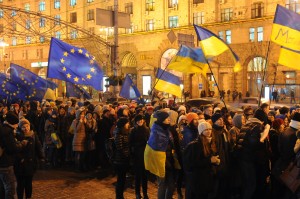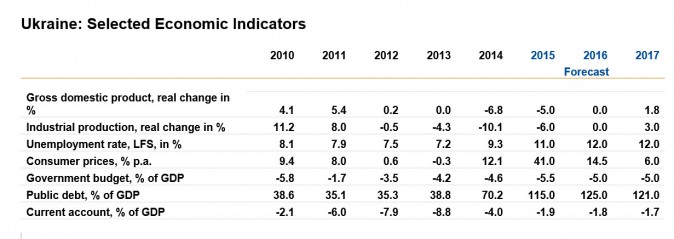15. April 2015, 12.00 hrs
Press Release
How to stabilise and reform Ukraine’s economy: In a study drawn up for the non-profit association United Europe, the Vienna Institute for International Economic Studies (wiiw) shows what the European Union can do to help this country out of its deep crisis.
 Nearly a quarter century after the break-up of the Soviet Union, Ukraine’s economy is in terrible shape. GDP per capita is only 65% of what it was in 1991, and the situation is likely to get worse, as the Vienna Institute for International Economic Studies (wiiw) shows in its new study “How to Stabilise the Economy of Ukraine”. In 2015, the military conflict, galloping inflation and the collapse of trade and investment will plunge Ukraine’s economy into deep recession for the second year running.
Nearly a quarter century after the break-up of the Soviet Union, Ukraine’s economy is in terrible shape. GDP per capita is only 65% of what it was in 1991, and the situation is likely to get worse, as the Vienna Institute for International Economic Studies (wiiw) shows in its new study “How to Stabilise the Economy of Ukraine”. In 2015, the military conflict, galloping inflation and the collapse of trade and investment will plunge Ukraine’s economy into deep recession for the second year running.
Economic stabilisation and a return to sustainable and inclusive economic growth will be impossible without a resolution of the military conflict. Restoration of normal economic activities in the affected territories will also require massive public investment. According to wiiw, the EU could play a crucial role here. “Ideally, the EU would design a ‘Marshall Plan’ for Ukraine which would include financial aid, institutional reform and help to foster economic restructuring, trade and investment”, said Peter Havlik, one of the authors of the study.
The West also needs to be sensitive towards the social impact of the stabilisation policies currently implemented in Ukraine as part of the IMF-led programme. The impact of such policies on ordinary Ukrainian citizens should be carefully considered so as not to erode the necessary reform support.
Ukraine: Selected Economic Indicators
 Given the deep economic division of Ukraine, economic stabilisation will not be possible without bolstering Ukraine’s trade both with the EU and with Russia. Despite the recent downturn, Russia is still Ukraine’s single most important trading partner. Trade disruptions with Russia affect above all Ukraine’s machine-building sector located mostly in the eastern part of the country. Annual losses for Ukraine from the break-up of economic relations with Russia are estimated at USD 33 billion.
Given the deep economic division of Ukraine, economic stabilisation will not be possible without bolstering Ukraine’s trade both with the EU and with Russia. Despite the recent downturn, Russia is still Ukraine’s single most important trading partner. Trade disruptions with Russia affect above all Ukraine’s machine-building sector located mostly in the eastern part of the country. Annual losses for Ukraine from the break-up of economic relations with Russia are estimated at USD 33 billion.
Under the crucial assumption that peace is restored, wiiw has drawn up policy recommendations for Ukraine’s European partner and the international community at large in four main areas to help put Ukraine on the path to sustainable, long-term growth:
- Encourage the Ukrainian government to shift spending priorities from the military to more socially-oriented spending and higher public investments. Forgive a large part of Ukraine’s foreign debt and allow the Ukrainian National Bank enough foreign exchange reserves to move to a more stable exchange rate regime.
- Financial and material assistance should be rigidly tied to progress on dismantling the oligarchic interests which have captured the Ukrainian state. This will require legal system reforms, the severance of relationships between business and politics, proper taxation of oligarchic assets and confiscation of illegally amassed wealth, including assets parked abroad.
- Apart from fostering EU integration, restore, as much as possible, trade linkages with Russia and the Russia-led Eurasian Economic Union (EEU) via trilateral negotiations. At the same time, develop a long-term modernization strategy including an industrial policy to improve competitiveness and restructure sectors like machinery, railway, chemicals, food processing and nuclear.
- Put together a coherent package to attract foreign direct investment by revitalising the FDI agency InvestUkraine and by setting up business and industrial parks with clear ownership rights, good transport connections, abundant and reliable energy and water supply as well as the support of the competent local/regional administration. Encourage cross-border production linkages with Central European economies.
“Under the current conditions, Ukraine’s economic outlook is bleak,” said the study’s co-author Michael Landesmann. “But we could see a marked improvement in growth and living conditions over the next five years if the EU helps Ukraine push through some of the reform steps we propose.”
To download the study, please klick here.
We gratefully acknowledge the financial support for this report by the Austrian Central Bank, Bertelsmann Stiftung, DER-think tank, ING Bank NV and Raiffeisen Bank International AG.
For further inquiries please contact Bettina Vestring or Christoph Riess at:



